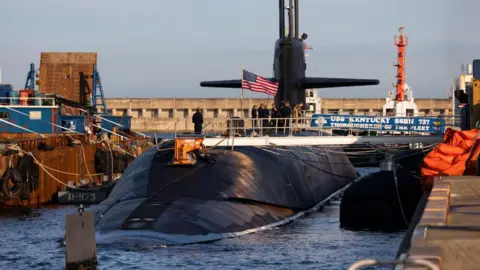The dynamic relationship between the Kremlin and the United States has recently featured heightened tensions following orders from President Donald Trump regarding the positioning of nuclear submarines. In a clear acknowledgment of Trump’s rhetoric, Kremlin spokesman Dmitry Peskov has addressed the situation, emphasizing a desire to avoid escalating the polemic. This declaration comes in light of Trump’s remarks asserting that two nuclear submarines would be moved closer to Russian territory, prompting various interpretations of the strategic implications behind such a move.
Upon reflecting on Trump’s orders, Peskov assured that US submarines are already engaged in combat-ready positions and downplayed the notion of any significant escalation in tensions. He articulated the sensitivity surrounding nuclear discussions, urging caution in the use of nuclear rhetoric amidst complex geopolitical dynamics. This comment highlights the stark differences in the perception of military maneuvers between the two nations, where the Kremlin seems keen on minimizing the effects of Trump’s provocative language.
Simultaneously, US envoy Steve Witkoff is scheduled to visit Moscow on Wednesday, suggesting that there is a continuous effort for diplomatic dialogue despite the ongoing provocations. Peskov expressed a welcoming stance to Witkoff’s visit, deeming interactions of such nature meaningful and necessary in bridging the gap amid rising hostilities.
Trump’s orders for the deployment of submarines stemmed from reactions to statements made by former Russian President Dmitry Medvedev, who criticized Trump’s ultimatum aimed at Russia over its actions concerning Ukraine. Medvedev’s commentary has a history of escalating rhetoric, framing Trump’s response as a game of ultimatums rather than constructive dialogue. Trump’s claims about positioning nuclear subs have further complicated such discourse, imposing a timeframe threatening consequences for non-compliance with his demands for a ceasefire in the ongoing war with Ukraine.
Amidst this backdrop, Peskov delineated that Russian foreign policy isn’t dictated by the variety of opinions within its leadership but rather by President Vladimir Putin’s directives. This revelation reinforces the centralized control within Russian policy-making, where dramatic shifts in strategy can emerge from singular decision-making authority. Interestingly, Medvedev has remained silent following Trump’s recent statements, suggesting a tangible impact or reconsideration about entering into a back-and-forth dialogue.
Efforts to build US-Russia relations improved markedly after Trump assumed office in January, although optimism has morphed into skepticism in light of ongoing military conflicts. Recent engagements indicate Trump perceives Putin’s commitment to resolving the Ukrainian crisis with increasing doubt, as characterized by the renewed interactions and threats concerning trade tariffs and sanctions against Russia should a ceasefire not be finalized by August 8. This impending deadline lends a sense of urgency and further polarization toward a possible resolution of the conflict, setting the stage for heightened diplomatic negotiations or confrontational responses.
As Russia remains the most sanctioned nation globally, Trump has acknowledged the challenges posed by these sanctions, noting Russia’s effectiveness in circumventing them. The complexity of the situation is compounded by three unsuccessful rounds of negotiations aimed at brokering peace between Russia and Ukraine, with significant differences remaining, particularly regarding military limitations and aspirations toward NATO. Following a statement from Putin reiterating the necessity to eradicate perceived crises in Ukraine, it becomes clear that ideological differences and preconditions for peace remain considerable barriers.
Overall, the intricate web of diplomatic relations, military positioning, and symbolic rhetoric defines the current landscape of US-Russia interactions. The anticipated visit from Witkoff may offer a unique platform for dialogue, but substantial trust issues loom over both nations, which would require more than gestures of goodwill to mend. The enduring backdrop of wartime strategies combined with the continuous evolution of rhetoric illustrates the challenges that lie ahead for both Trump’s administration and the Kremlin.












